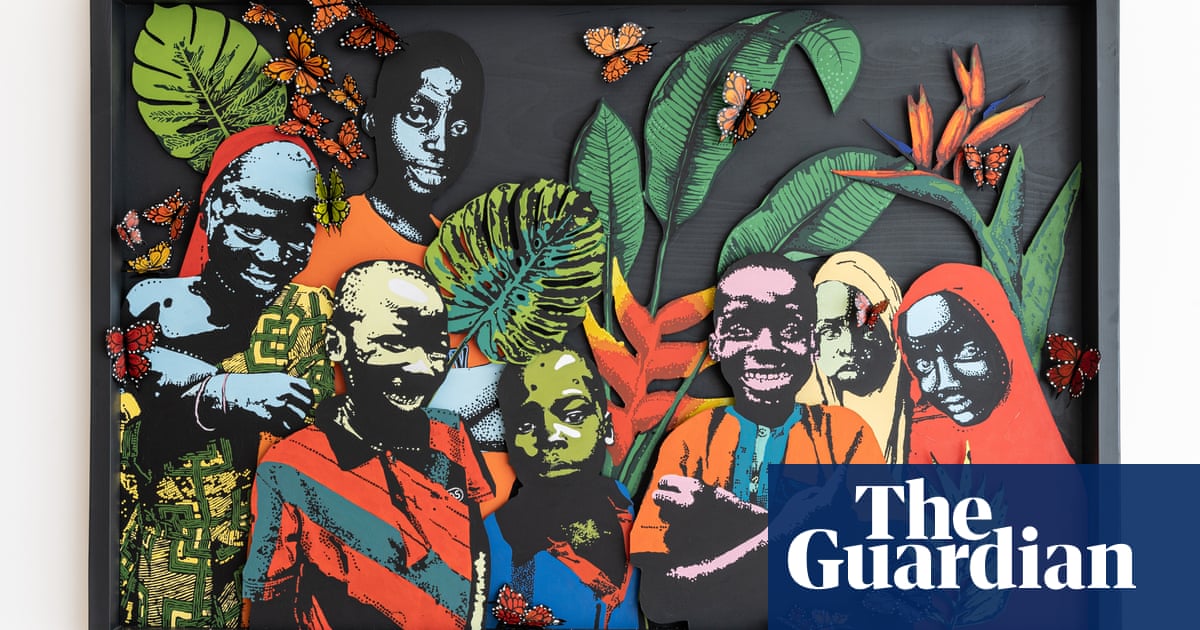
The US-born Nigerian gallerist Adenrele Sonariwo was four years old when a sudden turn of events in 1990 meant her family moved to Africa: her father inherited the role of a Yoruba traditional ruler in south-west Nigeria.
“My name, Adenrele, means ‘the crown is going back home’,” says the 37-year-old, who opened Rele Gallery in Mayfair, London, last month, aimed at showcasing African art to an international audience.
Sonariwo, who was named one of the New African magazine’s 100 most influential Africans of 2022, remembers participating in coronation festivities and walking in a long procession before her father received the crown, which rotates among a handful of ruling houses.
“There was a lot of pomp and pageantry. I would go to school and come back and there was always one activity or another in and around the palace,” she says.
“There was a whole programme of events, stages were constantly being built, there was drama, music, food, fashion and just an outright show of deep tradition and culture.”
Yoruba culture is complex, says Sonariwo. “My dad was a traditional ruler of more than 32 towns for 26 years and even between those towns cultures differ,” she says.
Sonariwo discovered recently that her Oríkì, a song or poem given to Yoruba children, was the same as that given to Peju Alatise, the Nigerian artist behind the new London gallery’s inaugural exhibition.
“She [Alatise] references it in her work and it was during the process of planning the show that I realised we shared the same Oríkì,” Sonariwo says. “We’re not even from the same town, but there’s an interconnectedness there. There’s a lot of similarities and a lot of differences.”
Yoruba culture has also travelled across borders. “I was in a restaurant in the UK – Chishuru – and I was quite delighted to see one of my favourite local Sagamu dishes on the menu,” she says. Last month, Chishuru’s founder and head chef, Adejoké Bakare, became the UK’s first black female chef to receive a Michelin star.
Sonariwo moved back to the US to go to college at the age of 15, before again returning to Nigeria and setting up the first Rele gallery, in Lagos, in 2015. A year later, she launched an art foundation, which has a successful programme for emerging artists called The Young Contemporaries.
“It has been almost 10 years since we opened in Lagos and, while our artists were getting recognition locally, I felt like these artists could benefit from the growth and exposure that would come from showing internationally,” she says about opening the Mayfair gallery.
In 2017, Sonariwo was the lead curator of the first Nigerian pavilion at the Venice Biennale. Seeing that the African country hadn’t been represented at the biennale “felt like a problem to me”, she says. Alatise was among the three Nigerian artists she chose for the pavilion.
Alatise’s show at Rele Gallery in London, We came With The Last Rain, is an exploration of Yoruba folklore and mythology. Some of her works revolve around the stories of rain and fertility. “A specific type of rain makes everything grow, with Oya, the rain-associated deity, ensuring fertility,” Alatise says. One work, Flying Girls, tells the story of Sim, a nine-year-old girl navigating the challenges of modern-day Lagos as a servant.
Opening a 3,000 sq ft exhibition space across two floors in London marks a milestone for the gallery, which also has a space in Los Angeles, says Sonariwo.
Few African women have established galleries across three continents. “Having a gallery that originated in Nigeria, with locations in two other continents is in itself a conversation shifter,” says Sonariwo. “It shows what is possible and achievable. It has allowed us to be able to tell inclusive, diverse stories that are not constrained to the singular narrative of what Africa is perceived to be.
“My biggest inspiration is the artists that I work with,” she adds. “It’s the fact that some of them come from very low-income places and being able to see that, through their art, they can change the course of their generation. That is the most important thing to me.”
As one of 17 siblings, family life has taught Sonariwo “a lot about diplomacy, about politics”, skills that she brings to her role.
“You have to learn how to navigate people’s emotions and personalities. It teaches you a lot about yourself. I love how it’s helped me to navigate life, even now.”












